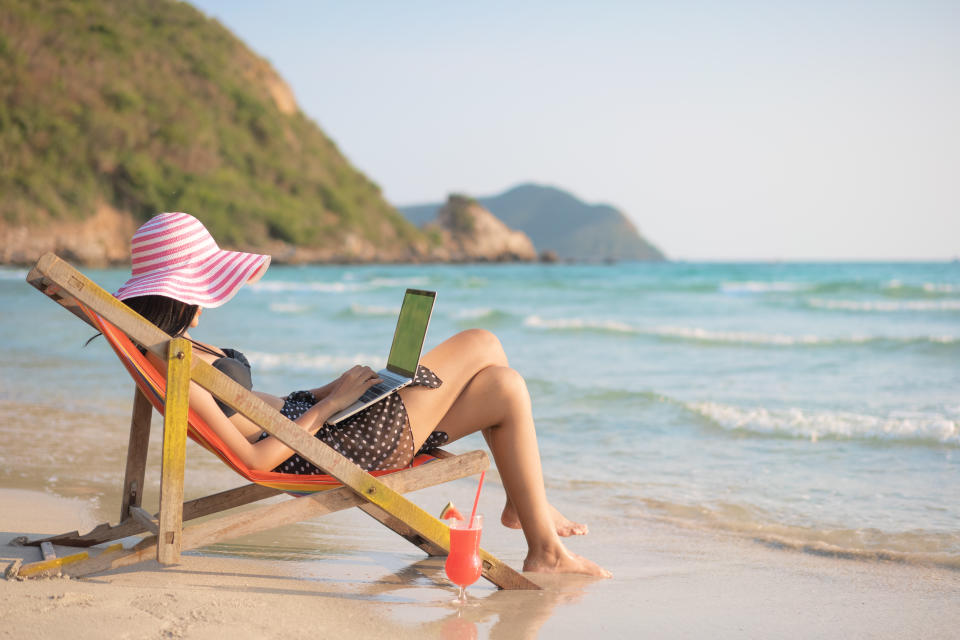Why 'workcations' are a terrible idea in a burned out society

The way we are working is constantly changing. Modern workplaces are looking less like the traditional, cubicle or open plan offices we’re used to — and now include chillout zones, games rooms and hammocks. An increasing number of people are working from home, either a few days a week or full-time. And some lucky employees are able to set up their workspace by a pool, cocktail in hand.
In theory, a ‘workcation’ sounds like a dream come true. Instead of taking actual time off from work — with no emails, messages from your boss, conference calls or projects — employees can travel while working on the go. You might not get a break, but you get a change of scenery and the chance to go somewhere new, without dipping into your annual leave.
There are multiple benefits to escaping your office. According to Elizabeth Sander, assistant professor of organisational behaviour at Bond Business School in Australia, changing your work environment is key to thinking differently, which can boost creativity. And the more biodiverse our working environment, the better — as being outside and around nature is known to improve productivity, mental wellbeing and even reduce sick leave.
READ MORE: Why we still need to take annual leave in 2020
Workcations aren’t for everyone, of course. Some professions require workers to be in a certain location, such as schools, hospitals or factories. And considering many employers are still reticent about letting staff work from home, only a very select few will agree to people working from a beach.
But there’s another key problem with the concept, too. Finding a good work-life balance is already difficult for many people — and workcations blur the distinction between our work and personal lives even further.
Although many countries have imposed statutory limits on the work week, around 22% of workers worldwide are working more than 48 hours a week. Worries about underemployment, unemployment, automation and job insecurity are some of the reasons why we are working longer hours, as well as being constantly connected by technology.
When you’re always contactable by email, Slack, Zoom or other apps, it’s difficult to switch off from work. As a result, few of us are working solely within our allocated “office” hours. And no matter how hard we try to avoid going through our inboxes while on holiday, many of us are guilty of checking up on work when we should be relaxing.
Although there is little chance of jetting off this summer because of the coronavirus restrictions, research has shown few people take their full allocated holiday allowance. Of 2,000 adults polled by the job site Glassdoor in 2018, two in five employees reported taking a maximum of just half their annual leave entitlement during the last holiday year. Of those that did use their allowance, 23% regularly checked emails. A further 15% continued working through fear of getting behind and the consequences of not hitting their targets.
Overworking and always being “on” has a dire impact on our mental wellbeing, physical health and counterintuitively, our careers. Multiple studies have linked working longer hours to an increased risk of chronic fatigue, stress, anxiety, poor sleep quality, alcohol use and other problems.
READ MORE: How COVID-19 will change the way we work in the long-run
Another meta-analysis of more than 600,000 people, published in the medical journal The Lancet, highlighted the risk to our physical health. Employees working long hours of between 40 and 55 hours per week have a higher risk of stroke compared with those working standard working hours, between 35 and 40 hours.
And while we might think spending longer at our desks will help us get ahead, research suggests this isn’t the case. The disruption of our work-life balance leads to lower job satisfaction and performance, as we don’t get the rest and recuperation we need to work effectively.
There’s nothing wrong with working elsewhere from time to time — and flexible working is something that should be encouraged. But the problem arises when our work begins to infiltrate the time we should be spending on ourselves and other things. With anxiety, stress and burnout growing issues in the workplace, perhaps we should draw a clearer line between our work and personal lives.

 Yahoo Finance
Yahoo Finance 
